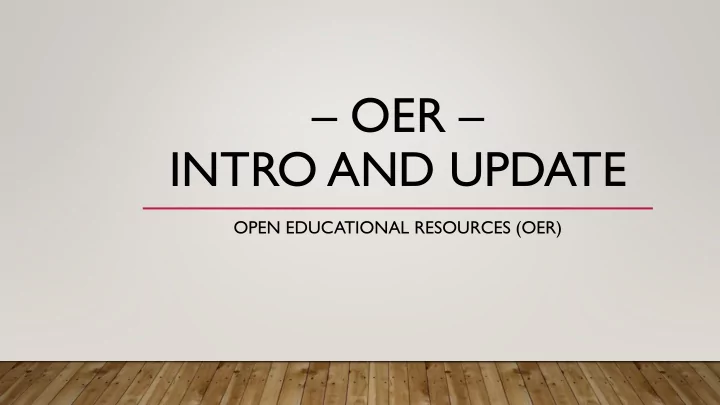

– OER – INTRO AND UPDATE OPEN EDUCATIONAL RESOURCES (OER)
WHAT IS OER? • Open Educational Resources • Open Educational Resources are teaching, learning, and research resources that reside in the creative commons and/or public domain or have been released under an intellectual property license that permits their use and repurposing by others. OER may include full courses, course materials, modules, textbooks, streaming videos, tests… used to support access to knowledge . "OER Defined" by Larry Kramer, William & Flora Hewlett Foundation / A derivative from the original work
5R S • David Wiley’s 5R s for OER • Retain • Reuse ***NOTE: ALL BASED ON THE LICENSURE • Revise • Remix • Redistribute
LICENSURE – CREATIVE COMMONS
CURRENT PRACTICE – PUBLISHER • Outcomes/Competencies • Chose a textbook • Work with publisher provide materials – PowerPoints and other resources • Build course with other supplementary materials • “Unstated Outline” provided by the publisher
OER OPTIONS FOR COURSE DESIGN • What do the 5Rs mean? • Most basic Creative Common Licensure – Attribution (BY) • Strip the textbook down to its bones and then rebuild with what the Instructor wants to keep and discard what the instructor does not need or wants to use something different (other OER Resources) • Using Outcomes/Competencies to create their own outline
BENEFITS - STUDENTS • Affordability – Cost (no-cost or low-cost) • Access – Immediate access to materials • What does this mean? • Everyone starts the class in the same place – no waiting for a textbook • Helps with retention (no textbook – drop class or withdrawal/fail) and improve student success • Reduces student stress and time gathering materials • Achievement – Increase opportunity for student success
BENEFITS - INSTRUCTORS • Academic Freedom – option for more creativity and innovation in the classroom • Knowledge of everyone having the needed material • Opportunities to re-engage in the curriculum, provide/use assessment, for redesign
CHALLENGES • Encouraging and empowering Instructors to make the first steps into moving to OER • Realizing the options for resources and the opportunities they provide
STATUS/PROGRESS • OER Guide has been completed • OER Review Structure and Rubric have been completed and are ready to be piloted • Currently working with Project5! Instructors for development of OER courses (online) • PYSC 1000 – General Psychology – Mark Knapp • MATH 1828 – College Algebra – Ange Davied • COMM 1230 – Public Speaking - Alissa Duncan and Angela Lewis • HIST 1400 – American History to 1877 – Mike Cox • ENGL 1204 – English Composition 1 – Melissa Rigney and Karly Little • Currently working with Brandon and Connie to develop OER icons and wording • Working with HR and IR to track OER information
FUTURE ITEMS IN DISCUSSION • Open Pedagogy : “A site of praxis (practice), a place where theories about learning, teaching, and social justice enter into a conversation with each other and inform the development of educational practices and structures.” (Open Pedagogy Notebook) • Short-hand – 5Rs – is the “What” – Open Pedagogy is the “How” • I have presented to IC on this and looking forward to further discussion. • Z-Degree – no textbook costs for an entire (60-hour degree)
Recommend
More recommend